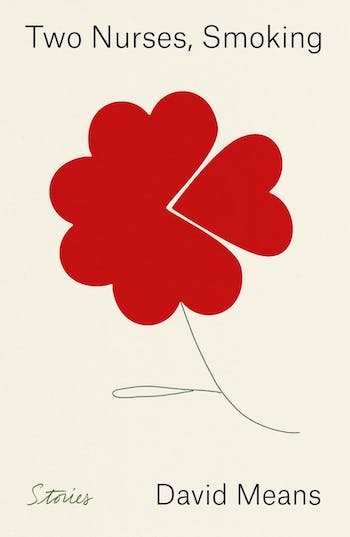Book Review: “Two Nurses, Smoking” — A Skillful Take on the Times
By Drew Hart
Many of the short stories in Two Nurses, Smoking are genuinely accomplished, and worth investigating.
Two Nurses, Smoking by David Means. Farrar, Straus & Giroux; 224 pp., $26 (hardcover)
 You know it, and I know it: this country is whacked out right now. As Donald Barthelme once put it, “There’s brain damage in the east, and brain damage in the west.” There’s also the kind in the hinterland and yet another variety among the coastal crowd. You don’t know it? David Means’ intense and absorbing new collection of stories, Two Nurses, Smoking will clue you in. The author is a product of a Rust Belt childhood in Michigan, and has been living in a Hudson River town north of New York City, teaching writing to Vassar kids — he’s equipped with sharp insight about these different worlds.
You know it, and I know it: this country is whacked out right now. As Donald Barthelme once put it, “There’s brain damage in the east, and brain damage in the west.” There’s also the kind in the hinterland and yet another variety among the coastal crowd. You don’t know it? David Means’ intense and absorbing new collection of stories, Two Nurses, Smoking will clue you in. The author is a product of a Rust Belt childhood in Michigan, and has been living in a Hudson River town north of New York City, teaching writing to Vassar kids — he’s equipped with sharp insight about these different worlds.
To begin with though, he would like to introduce you to a dog? In the collection’s opening piece, “Clementine, Carmelita, Dog,” we are listening to two narrative voices, one presumably that of Means, another that is the dog in the tale. Anyone who has experienced the Twitter account “Thoughts of Dog” will appreciate this! The purported dog insights here, the observations tied to the canine sense of smell or its memory, for example — are lucid. We also learn that there are “57 varieties of dog grief,” a la Heinz ketchup — as opposed to the 110 kinds humans endure, soon to be addressed in these pages. This story features a chase after a rabbit, in which our four-legged friend loses his sense of direction, winding up being adopted by different owners; as such, it recalls “Alice in Wonderland.” Is this a way to prepare us for the gallery of unexpected events in the following tales?
From here on in, we are at least in the realm of human characters, if perhaps no safer. Several stories are set in hardscrabble towns in Michigan, with people and places that are running low on hope. One example, “Are You Experienced?,” which relates to a couple of others in the bunch, depicts a relationship between a drug dealer and his runaway girlfriend, and their plan to abscond with an elderly uncle’s stashed money. Another is the bleak title story — a prismatic look at — well, two nurses smoking, and the lives they lead, in present and past. Marlon is a veteran of Iraq, burdened with horrific memories (that war is touched on often here, and must have personal meaning?); Gracie has a cut and dry life stemming from an impoverished childhood. They empty bedpans; they treat patients with kidney stones; they smoke together, as love grows between them. It’s one of the collection’s pieces that have multiple vantage points, alternate voices, and jumbled chronology. Sometimes the spirit is almost Cubist: “Two Nurses Descending a Staircase”? Here it is strong and affecting.
Elsewhere, we are in the river towns of the lower Hudson; these tales portray a less down and out, largely white-collar world, with well-to-do suburban lawyers and teachers, and often trade in adulterous doings, other first-world problems. Voices here are largely those of neurotic, educated middle-aged males, who often ramble on somewhat ponderously — making for a less successful story style than the fragmented, splintered pieces on offer elsewhere. The river is nearly a character itself — its treacherous currents take the lives of several people along the way: sailors, swimmers, bridge jumpers. And if not the Hudson, there are a bevy of car wrecks that bring death, or problems with teenage addiction. So, while not bleak Michigan, this is a troubled landscape in its own right. It isn’t Cheeveresque, although the trappings are, because Means brings his bee’s-eyed, postmodern approach to it with a great deal of elan.
Your F.C.* would like to award special props to the book’s longest offering — “Stopping Distance” — a chronicle of the love that grows between two older divorced survivors of children who have died tragically. They meet through the therapy meetings held in a local upstate church, and climb out of their despair into a deep relationship. It’s haunting and extremely touching. But overall, a lot of what is found in Two Nurses is genuinely accomplished, and worth investigating. Do so; if you don’t come away feeling more assured about the state of things these days, and you won’t, at least you’ll have tuned into a skillful take on the times.
Drew Hart – your *Faithful Correspondent (in case you forgot!) – writes from Santa Barbara, California

